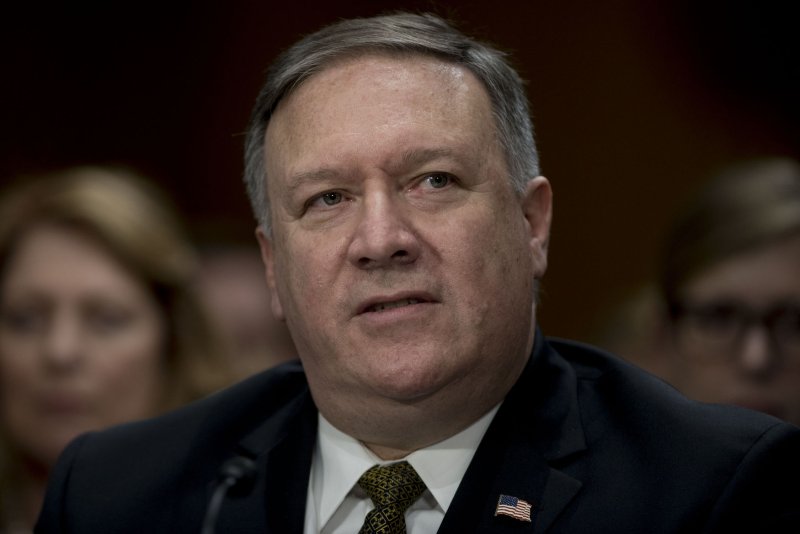Michael Pompeo is the new secretary of state. Photo by Leigh Vogel/UPI |
License Photo
The United States has a national security strategy and a national defense strategy. Both were written by professionals. Both are largely viewed as credible. But what is America's foreign policy?
Is it "America first" and what does that mean? Is it a policy of bilateral rather than multilateral diplomacy in which agreements such as the Paris Climate Change Accord and the TransPacific Partnership are impediments? Or is it a policy of lessened U.S. international engagement and involvement?
The answer is none of the above. American foreign policy today is what President Donald Trump decides it is, often on the spur of the moment. Moreover, it is a policy frequently announced by tweet in less than 280 characters that can come day or night and usually without warning. And it is a policy regularly uninformed by fact and truth and by presidential instinct and experience gained in a lifetime of real estate dealings.
On May 12, the president must decide on continuing the Joint Comprehensive Plan of Action that prevents Iran from obtaining nuclear weapons. French President Emmanuel Macron and German Chancellor Angela Merkel both have tried to persuade the president to stay the course. But Macron has said publicly that he believes the president will not heed his advice.
In about month's time, the president may meet with North Korea's leader Kim Jung Un to negotiate "denuclearization" of the peninsula and perhaps a peace treaty to replace the truce that halted the Korean conflict in 1953. How the president deals with the JCPOA could have serious if not profound consequences for the meeting with Kim. If the president chooses to leave that agreement, how might Kim react? Similarly, if he allows the agreement to continue, what responses might that provoke?
Withdrawal will obviously force Kim to question why the president would honor any agreement with his country. That doubt could induce Kim to impose certain guarantees to assure American compliance. One might be a formal treaty. But that treaty would require a two-thirds vote in the U.S. Senate. And, as with the Anti-Ballistic Treaty signed in 1972 and abrogated 30 years later, the same could happen with the North.
Similarly, what if the president took no action vis a vis the JCPOA? The likely answer is the same. At a later date, the president could change his mind. So make no mistake: Kim will have thought through both prospects, applying his natural suspicion and cunning in forming his responses.
The fundamental conceptual and practical flaws in using single issues such as the JCPOA or Korean meeting as surrogates for a coherent foreign policy are self-evident. What is America trying to achieve and how does the single issue conform with a broader policy? Denuclearizing the Korean Peninsula by itself is a noble aim. However, the chances that Kim will disarm are virtually zero for the foreseeable future.
More to the point, the logical conclusion of this negotiation could ultimately lead to some form of unification of the two Koreas. While that in itself may seem a viable outcome, that may not be favorably viewed in the region. Japan is the obvious case. However, China may not be entirely happy with unification, especially if the peninsula combined the south's economic viability with the nuclear programs of the north. And what is Plan B if there is no negotiation or negotiations fail?
It is unknown how deeply the president has weighed into thinking through this negotiation and considering first, second, third and other order consequences. His national security team in the White House is brand new. And while his just confirmed Secretary of State Mike Pompeo had the benefit of more than a year as director of the CIA, that perspective was far different from the view from Foggy Bottom.
Above all, an effective foreign policy for the 21st century must appreciate that 20th century concepts such as the notion of a largely bipolar strategic world no longer applies. Today's politics are too interconnected to be dealt with on a separate or isolated, one-off opportunity. The Korean dilemma as well as Syria involves many players all with different agendas. With Korea, the South, Japan, China and Russia have separate and often conflicting interests. Where is the overall foreign policy that takes each into account?
What now passes for "foreign policy" does not meet that criterion. The risk is that without a broader foreign policy construct, even a "successful" negotiation still could have many unfavorable downsides.
Harlan Ullman is the principal author of "shock and awe" and Distinguished Senior Fellow and Visiting Professor at the U.S. Naval War College. His latest book is "Anatomy of Failure -- Why America Loses Every War It Starts. Follow him @harlankullman.















